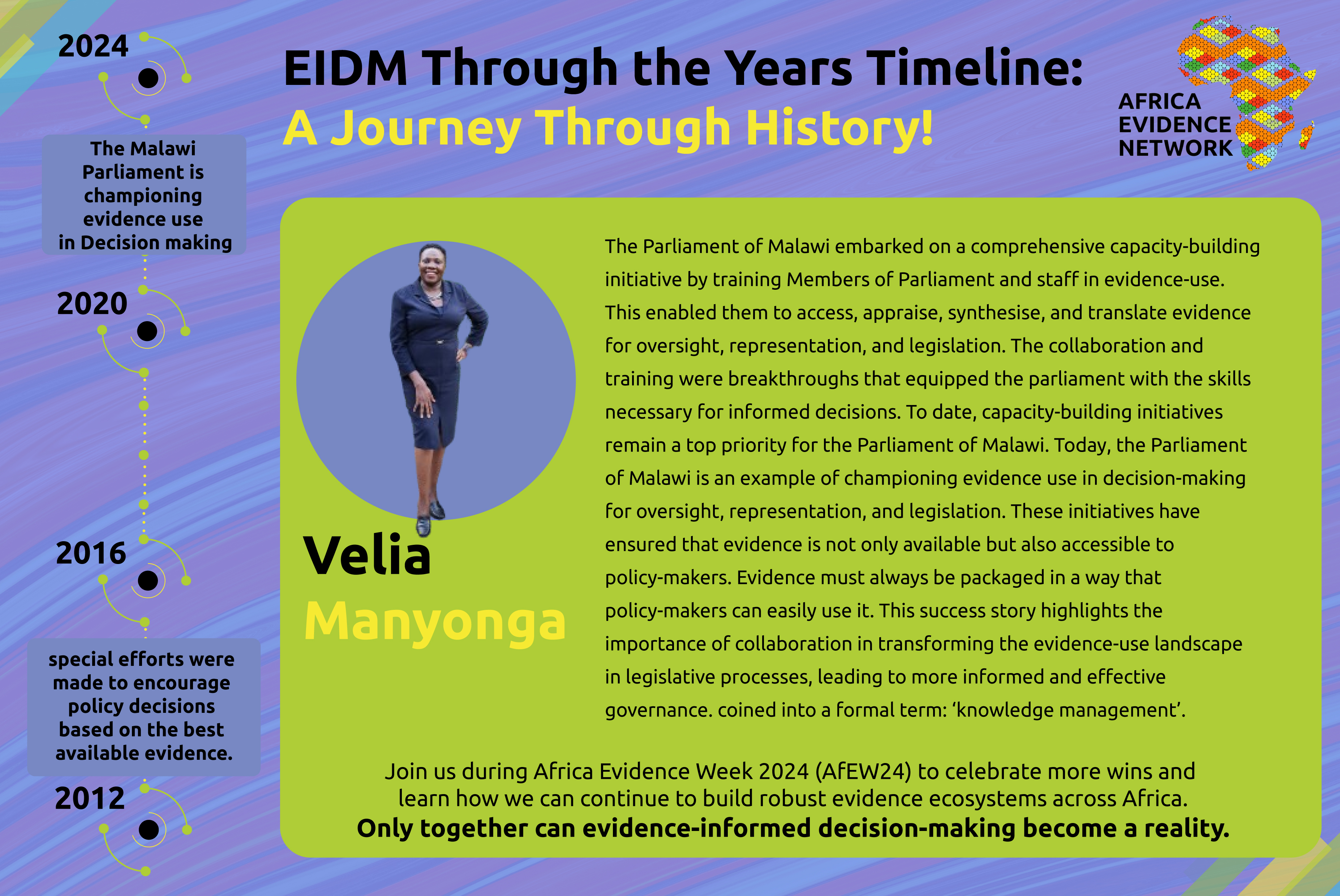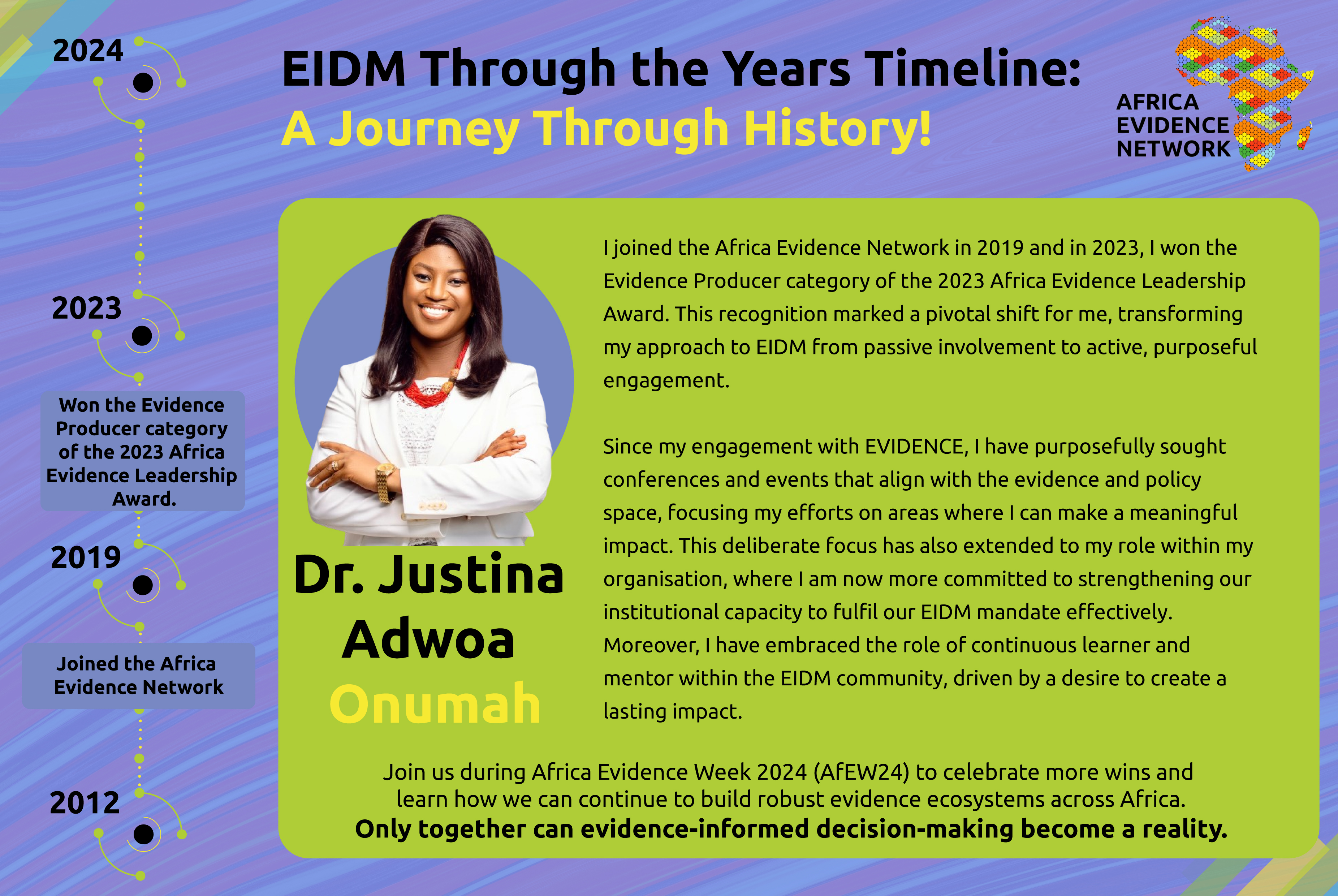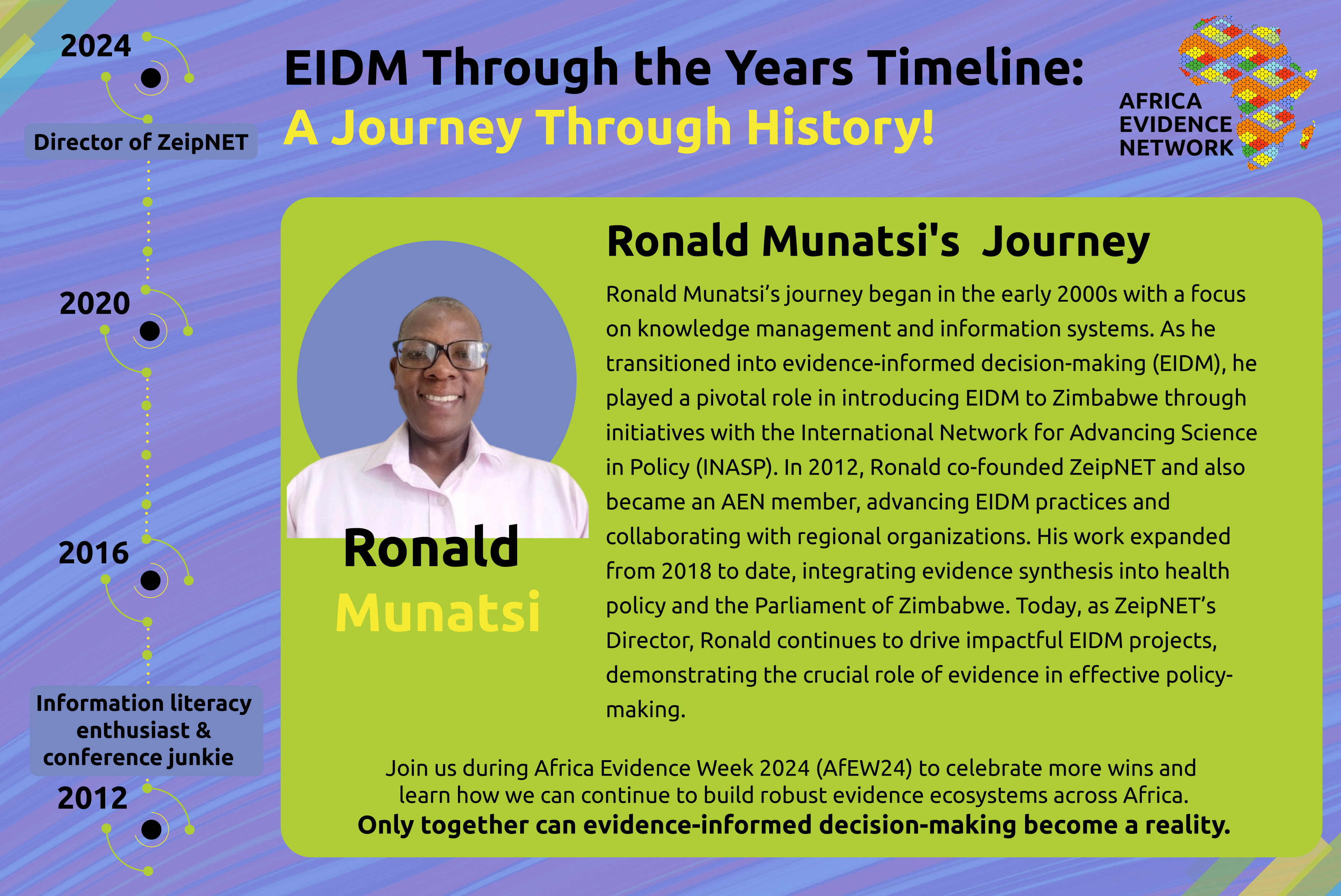
Welcome to the EIDM through the years timeline, where we celebrate Africa’s evidence-informed decision-making (EIDM) by reflecting on the incredible progress achieved in implementing EIDM across the continent. This is an interactive timeline showcasing key milestones in EIDM development.
In this conversation, the Africa Evidence Network talks to Velia Manyonga, Head of the Research Division at the Parliament of Malawi and the inaugural recipient of the Africa Evidence Leadership Award.
What are some of the challenges faced in launching EIDM in Africa?
Before 2010, the biggest challenge was the perception that evidence could only be generated by specific groups, particularly universities, and used by a limited set of institutions. This perception excluded the involvement of many institutions already using evidence from showcasing and celebrating their evidence generation and utilisation processes in different sectors.
As the journey continued, a shift began to emerge. We witnessed the rise of diverse groups involved in evidence production: evidence producers, mediators (such as knowledge brokers or translators), and evidence users. This period also saw the emergence of young leaders dedicated to promoting evidence-based practices.
Interestingly, institutions once thought incapable of using evidence, like parliament, became part of the sectors championing evidence-based decision-making. They started leading the way in using evidence for legislation, oversight, and representation. This marked a significant transformation in the acceptance and application of evidence across various sectors.
Can you share a specific story about a time when EIDM implementation led to a major breakthrough?
One of the success stories for the Parliament of Malawi highlights significant strides in enhancing evidence-informed decision-making in their critical functions of oversight, representation, and legislation. This journey began around 2012 when special efforts were made to encourage policy decisions based on the best available evidence.
These efforts included collaboration between think tanks like the African Institute for Development Policy (AFIDEP) and universities, working together to support the parliament in using evidence. This collaboration revealed several key issues. While much evidence was available, it was not presented in a way that policy-makers could easily understand and use. This created the need for evidence translation and infrastructure development to support evidence use.
The Parliament of Malawi embarked on a comprehensive capacity-building initiative by training Members of Parliament and staff in evidence-use. This enabled them to access, appraise, synthesise, and translate evidence for oversight, representation, and legislation. The collaboration and training were breakthroughs that equipped the parliament with the skills necessary for informed decisions. To date, capacity-building initiatives remain a top priority for the Parliament of Malawi.
Today, the Parliament of Malawi is an example of championing evidence use in decision-making for oversight, representation, and legislation. These initiatives have ensured that evidence is not only available but also accessible to policy-makers. Evidence must always be packaged in a way that policy-makers can easily use it. This success story highlights the importance of collaboration in transforming the evidence-use landscape in legislative processes, leading to more informed and effective governance.
Are there any key partnerships or collaborations that stand out as pivotal moments in EIDM’s growth?
Yes, what stands out for me as a pivotal moment in the growth of EIDM is the use of evidence in the Parliament of Malawi. It has a high turnover rate, with only 35% of members retained after each five-year election cycle. This necessitates frequent training in evidence use, straining government resources. Collaboration with development partners and think tanks is essential to ensure continuity in evidence-informed decision-making for oversight, representation, and legislation functions.
Intensive training is provided in the first year, followed by continuous support and mentorship. Tools and resources are developed to make evidence accessible, alongside a clear monitoring and evaluation framework to assess impact. This equips parliamentarians and staff with essential skills for increasing evidence use while strengthening partnerships. In the long run, a culture of evidence-use is established, ultimately improving evidence-informed legislation that improves positive policies for Malawi.
About the author: Velia Manyonga has over 18 years’ experience in evaluating projects and programmes supporting decentralisation efforts in the Sub-Saharan African country Malawi for international and national NGOs (like World-vision, Save the Children and Plan/Malawi), and Malawian institutions (like Family Planning Association of Malawi, and the Parliament of Malawi).
Velia has extensive expertise, experience and knowledge in the area of local governance, inclusive participation and the public service sector in Malawi, incl. in the public health (water, sanitation and hygiene), (basic) education and women and youth economic empowerment sector. Her Relevant experience comprises the Baseline Study for Enhancing Youth Participation in Governance Project for Plan Malawi International, the Endline Evaluation of the Malawi Maternal and Newborn Health Program of Save the Children, the, the End of Year Evaluation for Community Activity in Harmonizing Cultural Practices with Sexual and Reproductive Health Rights for Family Planning Association Malawi, the Baseline study for World Vision’s Chigodi Malawi Integrated Water, Sanitation and Hygiene (MI-WASH) project and Chigodi Malawi Literacy for Empowerment through Action Research and Networking (MLEARN) Project.
Acknowledgements: The author(s) is solely responsible for the content of this article, including all errors or omissions; acknowledgements do not imply endorsement of the content. The author is grateful to Charity Chisoro for her guidance in preparing and finalising this article, as well as her editorial support.
Disclaimer: The views expressed in published blog posts, as well as any errors or omissions, are the sole responsibility of the author/s and do not represent the views of the Africa Evidence Network, its secretariat, advisory or reference groups, or its funders; nor does it imply endorsement by the afore-mentioned parties.
Suggested citation: Manyonga, V. (2024) Evolving Evidence: Integrating EIDM in Parliaments – A Spotlight on Malawi's Transformation. Blog posting on 7 August 2024. Available at: https://www.africaevidencenetwork.org/en/learning-space/article/339/

